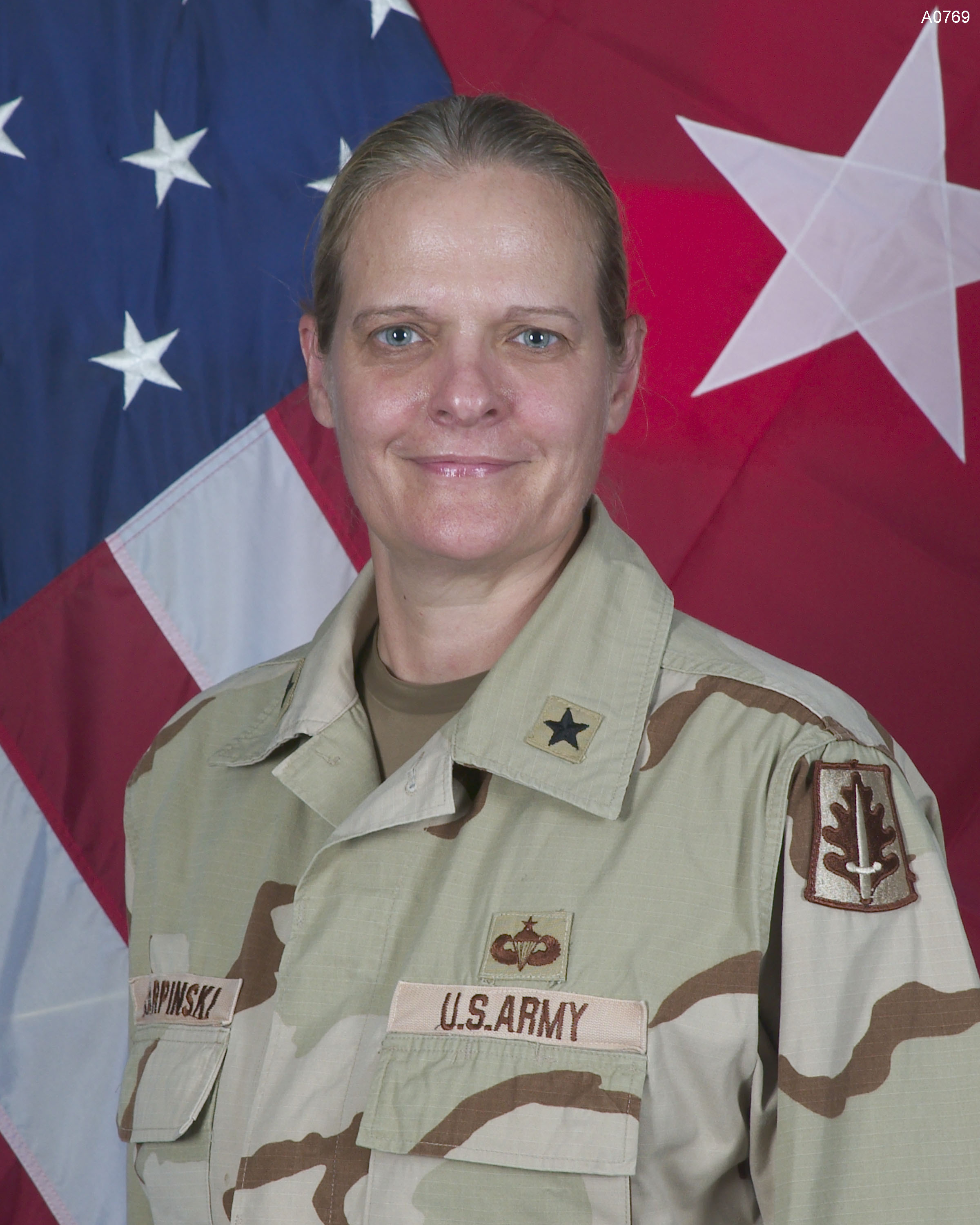An Interview with General Karpinski
SCV NEWSMAKER OF THE WEEK:
Brig. Gen. Janis Karpinski
Fmr. Commander, 800th Military Police Brigade
 Interview by Leon Worden
Interview by Leon Worden
Signal City Editor
Sunday, July 4,
2004
(Telephone interview conducted June 29, 2004)
**MEDIA—MANDATORY CREDIT: The Signal newspaper of Santa Clarita, Calif.
**OK to republish in whole or part for news purposes WITH CREDIT.
[...]
Signal: What was his plan?
Karpinski:
Well, during the in-brief, he made reference several times to his plans
to "Gitmo-ize" the interrogation operations. And he was the commander
down at Guantanamo Bay; he was extremely successful, apparently, in
getting actionable intelligence from the interrogations that were being
conducted there. And he was going to use that template of operations in
Iraq.
So, I was concerned, and like I said I was
really a guest at the
in-brief, but I had to talk. I had to speak up. Because, I said to him,
"Sir, excuse me," I said, "I'm Janis Karpinski, I'm the commander of
the 800th MP Brigade, but the situation in our facilities is a little
bit different that your situation down in Guantanamo Bay. Some of our
locations are being fired on at night. We don't even have funding
enough to buy a jumpsuit for every one of our detainees. We have
thousands of prisoners and not nearly enough MPs to guard them." And he
was looking at me like I was some kind of a brainless idiot or
something. He was waving his hands at me almost as if he was dismissing
me. And he said, "Those things are not a problem. My annual budget is
$125 million, and I'm going to give the military intelligence people
whatever funds they need. We're going to take care of all that. But
first we have to find a location. And we have reduced the list to three
or four, and we're going to be out there visiting them." And —
obviously I didn't have a voice with him. Because what I was telling
him was inconsequential to his plan to "Gitmo-ize" the interrogation
operation.
Signal: Was Abu Ghraib the only place where interrogations were happening?
Karpinski: Under my control, yes. We had interrogations of a much different nature down at Camp Bucca, when the prisoners of war were being housed there, and then we had a very limited — we didn't, but the military intelligence people had — a very limited interrogation cell at our HVD facility, which was the High-Value Detainees. It was a much smaller operation. That was what people referred to as the "deck of cards."
Signal: Describe, if you would, the responsibility of military police in the interrogation process?
Karpinski:
Well, up to the point of Gen. Miller's visit, the military police role
in supporting interrogation operations was extremely limited, extremely
conservative, and by the book. They were detaining — we were
responsible for detention operations and all of the things implied.
Feeding them, getting them medical attention, getting them showers,
those kinds of things. Military police personnel would take the
prisoner out of the cell, turn them over to the interrogation team;
they would sometimes escort them to where the interrogation was going
to be conducted — usually a small room or something — but they were not
involved in the interrogation. They didn't wait while the interrogation
was taking place. They were certainly never used as they were after
Miller's visit to enhance the interrogation effort. Ever.
[...]
Karpinski: Right. But — it's not only, get to the "mob" station, get a class; they're trained throughout the year and it's part of the qualifications. And in addition to that, my brigade JAG officers and my battalion JAG officers would routinely do refresher training with them, to remind them of — and a lot of times the MPs would go to the JAG officers and say, "What are we doing with the Iraqi criminals? Are they entitled to the same things?" Because their prisoners are asking questions. And the reasons they were asking questions was because every prisoner was provided with a copy of the Geneva-Hague conventions in their language. So they knew what their rights and privileges were.
Signal: Every prisoner?
Karpinski: Every prisoner.
Signal: Was given a copy of the Geneva conventions?
Karpinski:
Yes. And it was posted on the wall of the cellblocks, and it was posted
in each one of the compounds. Even, I mean, the concertina wire — each
compound had a compound representative who could speak some English,
and if they had any questions or concerns, they would bring the
questions to the NCOIC, the noncommissioned officer in charge of that
particular compound. That's the way it works.
[...]
Signal: When did you first learn of the abuses?
Karpinski: I was up in another location outside of Baghdad. We had a different kind of security mission. And it was about an hour and a half away from Baghdad. We were meeting with the leaders at that location, and we finished the meeting — they liked to meet late at night. So we finished the meeting at about 11 o'clock, 11:30 at night. I went back into the operations office up there and I checked my e-mail, and there was an e-mail there from the CID (Army Criminal Investigation Division) commander. So I opened it up and I said, what the heck is this? And it said — that was the first time, and it was almost as if he thought of me as an after-fact or an afterthought.
Signal: This was when?
Karpinski: This was on the 16th of January. And it said, "Ma'am, just wanted to let you know, I'm going in to brief Gen. Sanchez on the progress of the investigation at Abu Ghraib. This is the one about the potential — or, the allegations of abuse, and there's pictures." And really, my mouth dropped open....
 :
Joseph j7uy5
:
Joseph j7uy5
<< Home